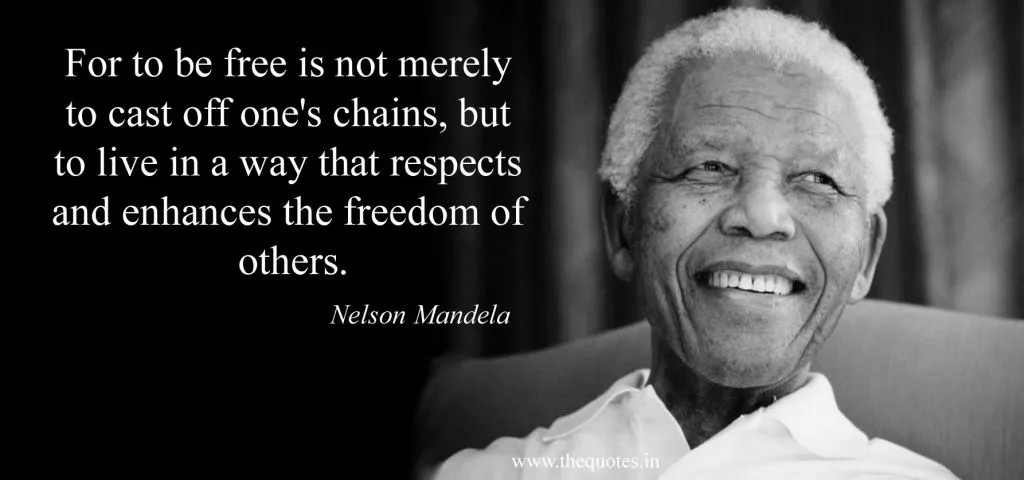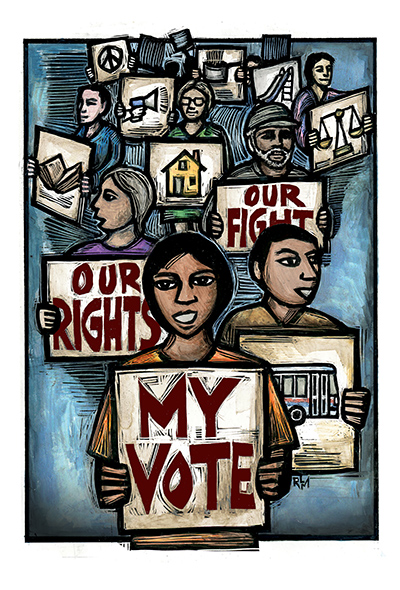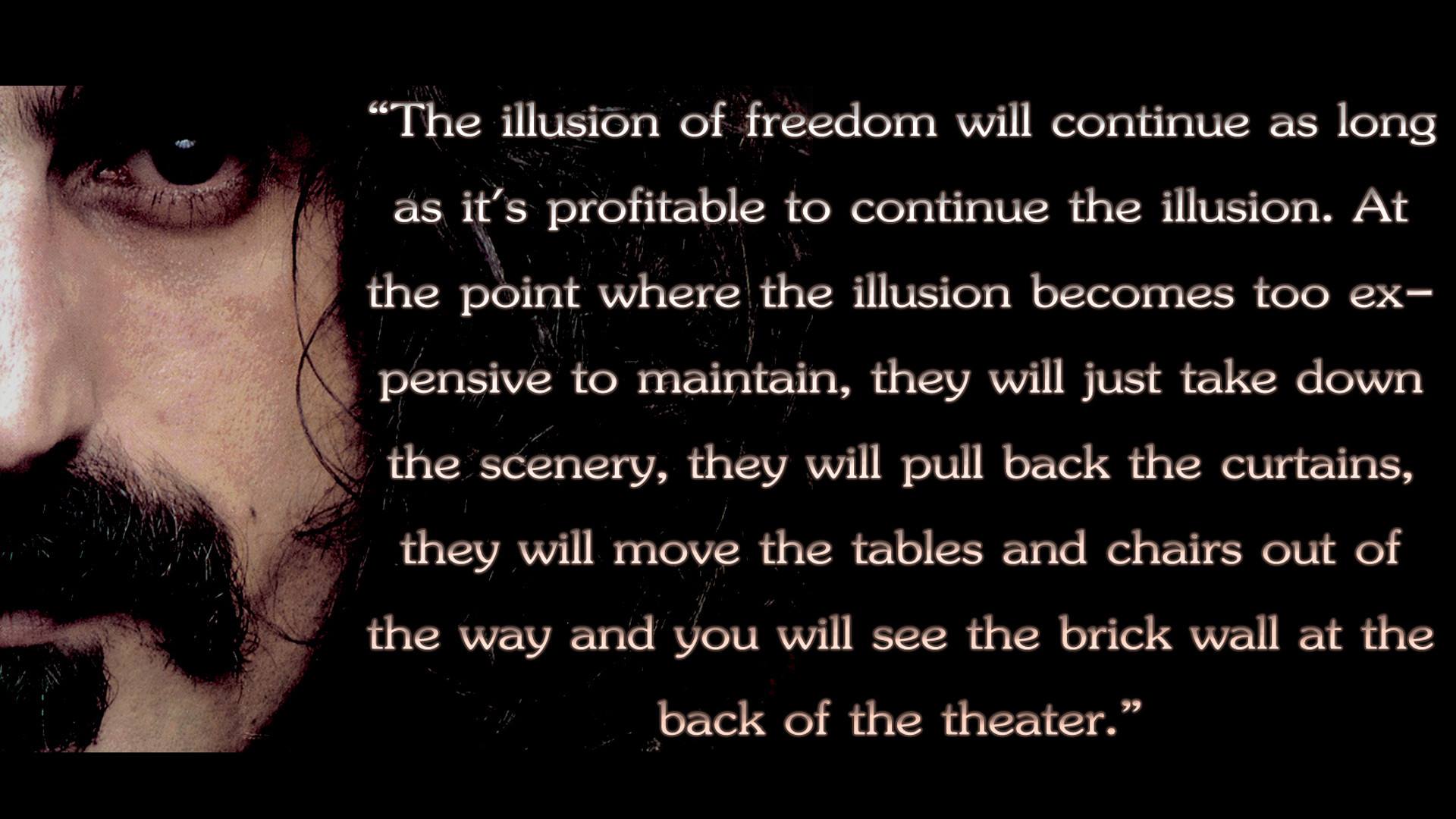Blog
Roberta Joan “Joni” Mitchell CC (née Anderson; born November 7, 1943) is a Canadian-American singer-songwriter, multi-instrumentalist, and painter. As one of the most influential singer-songwriters to emerge from the 1960s folk music circuit, Mitchell became known for her personal lyrics and unconventional compositions which grew to incorporate pop and jazz elements. Among her accolades are eleven Grammy Awards, and induction into the Rock and Roll Hall of Fame in 1997. Rolling Stone called her “one of the greatest songwriters ever”, and AllMusic has stated, “Joni Mitchell may stand as the most important and influential female recording artist of the late 20th century.”
Mitchell began singing in small nightclubs in Saskatoon and throughout western Canada, before moving on to the nightclubs of Toronto. She moved to the United States and began touring in 1965. Some of her original songs (“Urge for Going”, “Chelsea Morning“, “Both Sides, Now“, “The Circle Game“) were recorded by other folk singers, allowing her to sign with Reprise Records and record her debut album, Song to a Seagull, in 1968. Settling in Southern California, Mitchell helped define an era and a generation with popular songs like “Big Yellow Taxi” and “Woodstock“. Her 1971 album Blue is often cited as one of the greatest albums of all time; it was rated the 30th best album ever made in Rolling Stone‘s 2003 list of the “500 Greatest Albums of All Time“, rising to number 3 in the 2020 edition. In 2000, The New York Times chose Blue as one of the 25 albums that represented “turning points and pinnacles in 20th-century popular music”. NPR ranked Blue number 1 on a 2017 list of Greatest Albums Made By Women.
Mitchell began exploring more jazz-influenced ideas on 1974’s Court and Spark, which featured the radio hits “Help Me” and “Free Man in Paris“ and became her best-selling album. Mitchell’s vocal range began to shift from mezzo-soprano to that of a wide-ranging contralto around 1975. Her distinctive piano and open-tuned guitar compositions also grew more harmonically and rhythmically complex as she melded jazz with rock and roll, R&B, classical music and non-Western beats. Starting in the mid-1970s, she began working with noted jazz musicians including Jaco Pastorius, Tom Scott, Wayne Shorter, Herbie Hancock, and Pat Metheny as well as Charles Mingus, who asked her to collaborate on his final recordings. She later turned to pop and electronic music and engaged in political protest. She was awarded the Grammy Lifetime Achievement Award in 2002.
Mitchell produced or co-produced most of her albums and designed most of her own album covers, describing herself as a “painter derailed by circumstance”. A critic of the music industry, she quit touring and released her 19th and last album of original songs in 2007. She gave occasional interviews and made appearances to speak on various causes over the next two decades, though the rupture of a brain aneurysm in 2015 led to a long period of recovery and therapy. A series of retrospective compilations were released over the time period, culminating in the Joni Mitchell Archives, a project to publish much of the unreleased material from her long career. She returned to public appearances in 2021, accepting several awards in person, including a Kennedy Center Honor. Mitchell returned to live performance with an unannounced show at the June 2022 Newport Folk Festival and has made several other appearances since, including a headlining show in 2023.
more...What is sure is that over 900 large stone statues called moais exist there. The Rapa Nui (Easter Island) moais stand, on average, over twice as tall as a person and have over 200 times as much mass. It is thought that the unusual statues were created about 600 years ago in the images of local leaders of a vibrant and ancient civilization. Rapa Nui has been declared by UNESCO to a World Heritage Site. Pictured here, some of the stone giants were imaged last month under the central band of our Milky Way galaxy. Previously unknown moais are still being discovered.
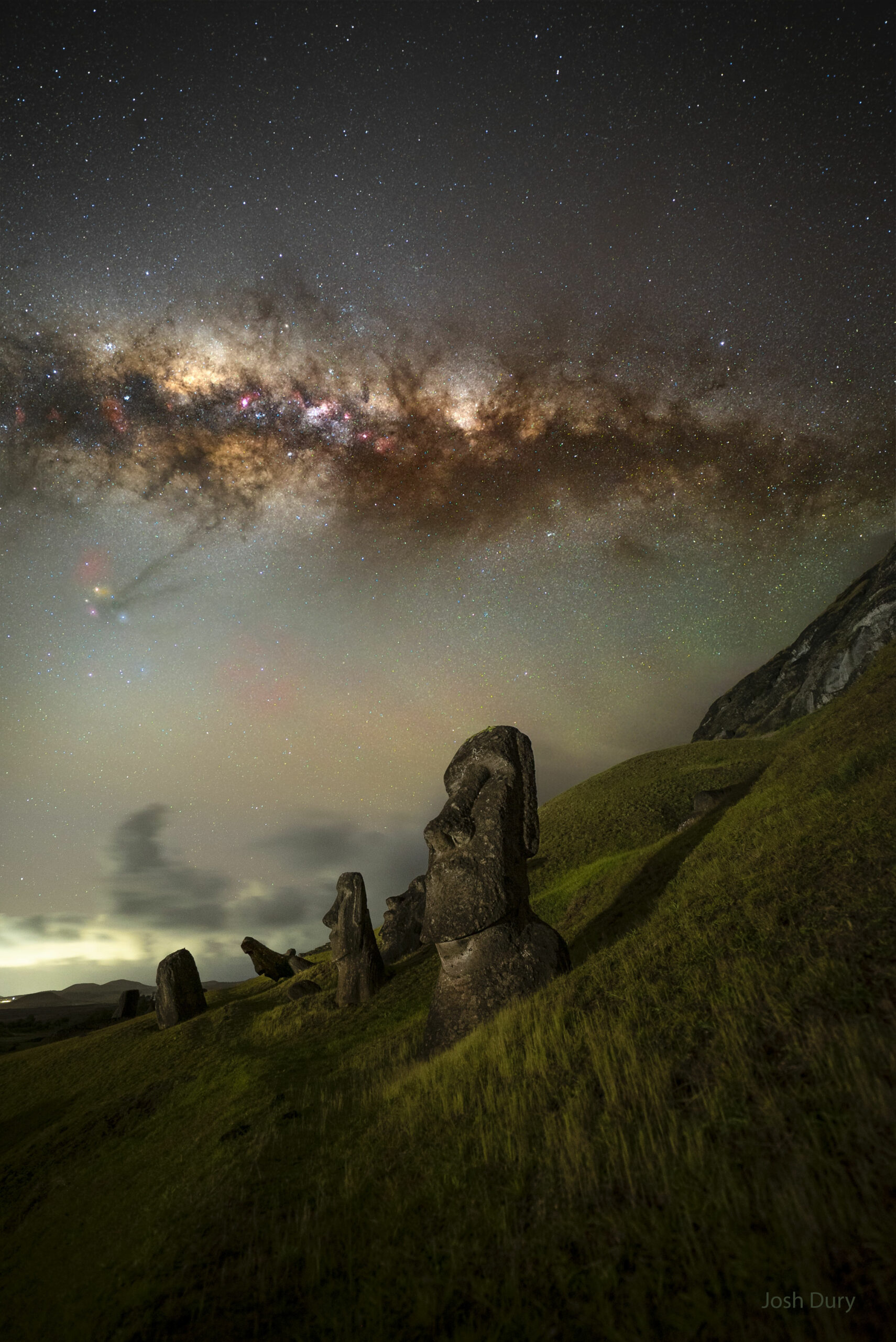
more...
Arturo Sandoval (born November 6, 1949) is a Cuban-American jazz trumpeter, pianist, timbalero, and composer. While living in his native Cuba, Sandoval was influenced by jazz musicians Charlie Parker, Clifford Brown, and Dizzy Gillespie. In 1977 he met Gillespie, who became his friend and mentor and helped him defect from Cuba while on tour with the United Nations Orchestra. Sandoval became an American naturalized citizen in 1998. His life was the subject of the film For Love or Country: The Arturo Sandoval Story (2000) starring Andy García.
Sandoval has won 10 Grammy Awards, Billboard Awards and one Emmy Award. He performed at the White House[1] and at the Super Bowl (1995).
more...Douglas Wayne Sahm (November 6, 1941 – November 18, 1999) was an American musician, singer-songwriter, and multi-instrumentalist from San Antonio, Texas. He is regarded as a key Tex-Mex music and Texan Music performer. San Antonio’s conjuntoand blues and later the hippie scene of San Francisco helped create his blend of music, with which he found success performing in 1970s Austin, Texas.
He made his recording debut as “Little Doug” in 1955. In 1965, Huey P. Meauxproduced Sahm and the Sir Douglas Quintet’s “She’s About a Mover.” Atlantic Recordssigned Sahm and released his debut solo album Doug Sahm and Band in 1973. In 1989, Sahm formed the supergroup the Texas Tornados with fellow Tex-Mex musicians Augie Meyers, Freddy Fender and Flaco Jiménez. The Texas Tornados toured successfully, and one of their releases earned a Grammy Award. In 1999, Sahm died during a vacation trip.
more...John Philip Sousa ( November 6, 1854 – March 6, 1932) was an American composer and conductor of the late Romantic era known primarily for American military marches. He is known as “The March King” or the “American March King”, to distinguish him from his British counterpart Kenneth J. Alford. Among Sousa’s best-known marches are “The Stars and Stripes Forever” (National March of the United States of America), “Semper Fidelis” (official march of the United States Marine Corps), “The Liberty Bell“, “The Thunderer“, and “The Washington Post“.
Sousa began his career playing violin and studying music theory and composition under John Esputa and George Felix Benkert. Sousa’s father enlisted him in the United States Marine Band as an apprentice in 1868. Sousa left the band in 1875, and over the next five years, he performed as a violinist and learned to conduct. In 1880, Sousa rejoined the Marine Band and served there for 12 years as director, after which he was hired to conduct a band organized by David Blakely, P.S. Gilmore‘s former agent. Blakely wanted to compete with Gilmore. From 1880 until his death, Sousa focused exclusively on conducting and writing music. He aided in the development of the sousaphone, a large brass instrument similar to the helicon and tuba.
Upon the United States joining World War I, Sousa was awarded a wartime commission of lieutenant to lead the Naval Reserve Band in Illinois. He then returned to conduct the Sousa Band until his death in 1932. In the 1920s, Sousa was promoted to the permanent rank of lieutenant commander in the naval reserve.
more...
The Great Nebula in Orion, an immense, nearby starbirth region, is probably the most famous of all astronomical nebulas. Here, glowing gas surrounds hot young stars at the edge of an immense interstellar molecular cloudonly 1500 light-years away. In the featured deep image in assigned colors highlighted by emission in oxygen and hydrogen, wisps and sheets of dust and gas are particularly evident. The Great Nebula in Orion can be found with the unaided eye near the easily identifiable belt of three stars in the popular constellation Orion. In addition to housing a bright open cluster of stars known as the Trapezium, the Orion Nebula contains many stellar nurseries. These nurseries contain much hydrogen gas, hot young stars, proplyds, and stellar jets spewing material at high speeds. Also known as M42, the Orion Nebula spans about 40 light years and is located in the same spiral arm of our Galaxy as the Sun.
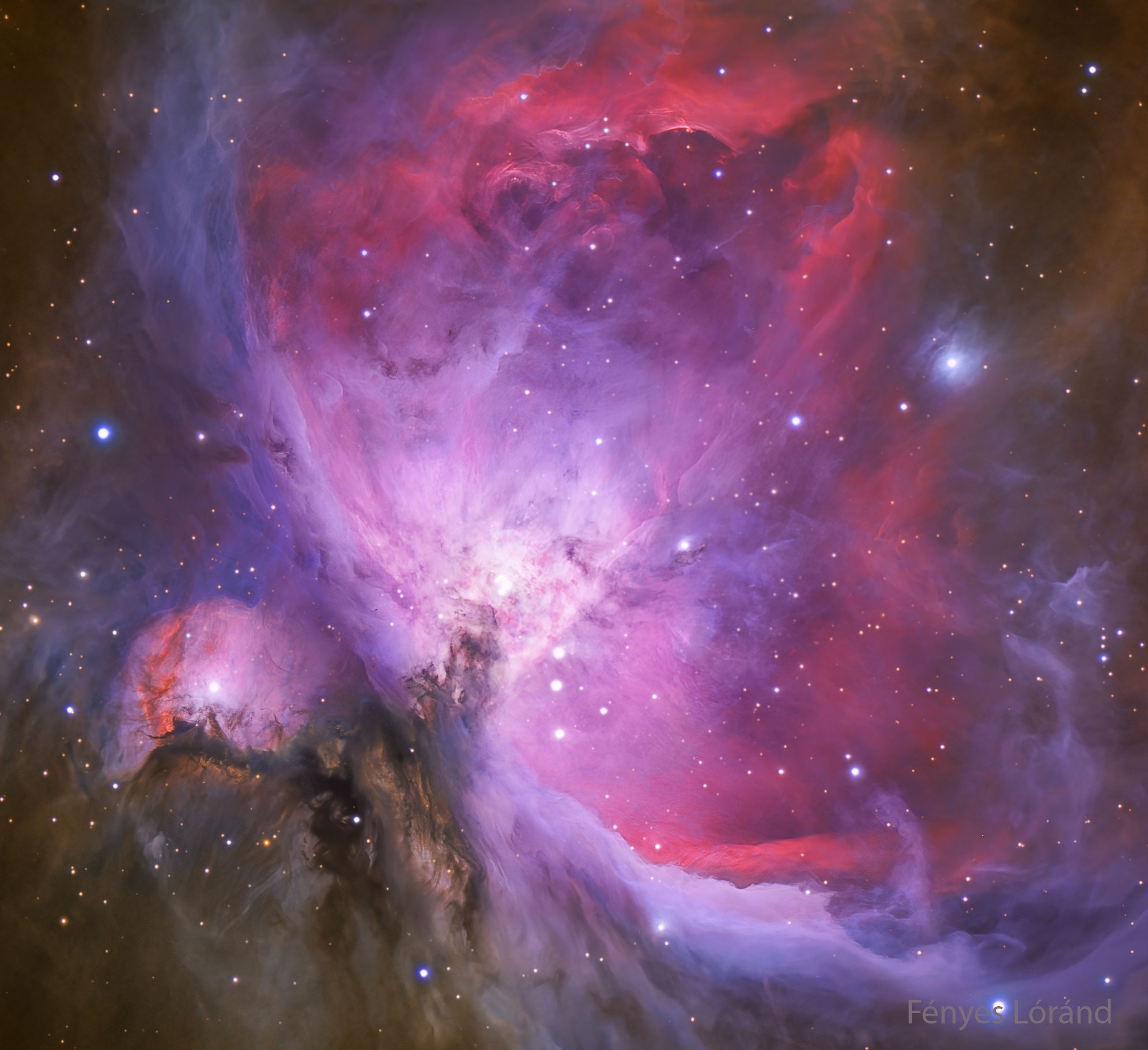
more...
Ingram Cecil Connor III (November 5, 1946 – September 19, 1973), known professionally as Gram Parsons, was an American singer, songwriter, guitarist, and pianist. He recorded as a solo artist and with the International Submarine Band, the Byrds, and the Flying Burrito Brothers, popularizing what he called “Cosmic American Music”, a hybrid of country, rhythm and blues, soul, folk, and rock.
Parsons was born in Winter Haven, Florida, and developed an interest in country music while attending Harvard University. He founded the International Submarine Band in 1966, but the group disbanded prior to the 1968 release of its debut album, Safe at Home. Parsons joined the Byrds in early 1968 and played a pivotal role in the making of the Sweetheart of the Rodeo album, a pioneering country rock album and a seminal progressive country recording. After leaving the group in late 1968, Parsons and fellow Byrd Chris Hillman formed The Flying Burrito Brothers in 1969; the band released its debut, The Gilded Palace of Sin, the same year. The album was well received critically but failed commercially. After a sloppy cross-country tour, the band hastily recorded Burrito Deluxe. Parsons was fired from the band before the album’s release in early 1970. Parsons spent the first half of 1971 with Keith Richards of the Rolling Stones, living in his French villa Nellcôte during the recording sessions for Exile on Main Street, though he contributed very little to the recording process itself. After traveling around Britain with friends in late 1971, he was treated for heroin addiction and returned to the U.S., where he was introduced to Emmylou Harris, who assisted him on vocals for his first solo record, GP, released in 1973. Although the record received enthusiastic reviews, it failed to chart. His health deteriorated due to several years of drug abuse, foreshadowing his death from a toxic combination of morphine and alcohol in 1973 at the age of 26. A posthumous solo album, Grievous Angel, peaked at number 195 on the Billboard chart.
Parsons’s relatively short career was described by AllMusic as “enormously influential” for country and rock, “blending the two genres to the point that they became indistinguishable from each other.” He has been credited with helping to found the country rock and alt-country genres. His posthumous honors include the Americana Music Association “President’s Award” for 2003 and a ranking at No. 87 on Rolling Stone‘s list of the “100 Greatest Artists of All Time. During the trip, Parsons often retreated to the desert, while the group visited bars in the nearby hamlet of Yucca Valley on both nights of their stay. Parsons consumed large amounts of alcohol and barbiturates. On September 18, Martin drove back to Los Angeles to resupply the group with marijuana. That night, after challenging Fisher and McElroy to drink with him (Fisher disliked alcohol and McElroy was recovering from a bout of hepatitis), he said, “I’ll drink for the three of us,” and proceeded to drink six double tequilas. They then returned to the Joshua Tree Inn, where Parsons purchased morphine from an unknown young woman. After being injected by her in room #1, he overdosed. Fisher gave Parsons an ice-cube suppository, and later, a cold shower. Instead of moving Parsons around the room, she put him to bed in room #8 and went out to buy coffee in the hope of reviving him, leaving McElroy to stand guard. As his respirations became irregular and later ceased, McElroy attempted resuscitation. Her efforts failed and Fisher, watching from outside, was visibly alarmed. After further failed attempts, they decided to call an ambulance. Parsons was declared dead on arrival at Yucca Valley Hospital at 12:15 a.m. on September 19, 1973, in Yucca Valley. The official cause of death was an overdose of morphine and alcohol.
Before his death, Parsons said he wanted his body cremated at Joshua Tree and his ashes spread over Cap Rock, a prominent natural feature there. However, Parsons’ stepfather Bob organized a private ceremony back in New Orleans and neglected to invite any of his friends from the music industry. Two accounts state that Bob Parsons stood to inherit Gram’s share of his grandfather’s estate if he could prove that Gram was a resident of Louisiana, explaining his eagerness to have him buried there.
To fulfill Parsons’ funeral wishes, Kaufman and a friend stole his body from Los Angeles International Airport and in a borrowed hearse, they drove it to Joshua Tree. Upon reaching the Cap Rock section of the park, they attempted to cremate Parsons’ body by pouring five gallons of gasoline into the open coffin and throwing a lit match inside; what resulted was an enormous fireball.
more...Arthur Ira Garfunkel (born November 5, 1941) is an American singer, actor and poet who is best known for his partnership with Paul Simon in the folk rock duo Simon & Garfunkel. Born in Forest Hills, Queens, New York, Garfunkel became acquainted with Simon through an elementary school play, a production of Alice in Wonderland. Their combined presence in music began in the 1950s, and throughout the 1960s the duo of Simon & Garfunkel achieved great chart success with tracks such as “The Sound of Silence“, “Mrs. Robinson” (written for the 1967 film The Graduate), “Scarborough Fair“, “The Boxer” and “Bridge over Troubled Water“. The latter song’s title also served as the name of Simon & Garfunkel’s final album in 1970. Simon & Garfunkel split for personal reasons, but the pair have occasionally reunited in the years since. Both men experienced success in solo careers in the years following the duo’s breakup.
Highlights of Garfunkel’s solo music career include one top 10 hit, three top 20 hits, six top 40 hits, 14 Adult Contemporary top 30 singles, five Adult Contemporary number ones, two UK number ones and a People’s Choice Award. Through his solo and collaborative work, Garfunkel has earned eight Grammy Awards, including a Lifetime Achievement Award. In 1990, he and Simon were inducted into the Rock and Roll Hall of Fame. In 2008, Garfunkel was ranked 86th in Rolling Stone magazine’s list of the 100 Greatest Singers of All Time.
more...Neil Cowley (born 5 November 1972) is an English contemporary pianist and composer. He has also released music as part of Fragile State, the Green Nuns of the Revolution, and the Neil Cowley Trio. With his trio, he appeared on Later… with Jools Holland in April 2008 and won the 2007 BBC Jazz Award for best album for Displaced. In 2018, Cowley announced he was working on a new electronic focused solo project.[2] In 2020, Cowley announced his debut solo album, Hall of Mirrors.
more...More Posts
- Milo Fine: Composing in Real Time
- Homewood Studios: You Do Not Have to Leave the Community to Find Great Art
- David Harris: Music Builds Community
- Jamie Carter: Music is a Reflection of Life
- Merlin Brunkow-Bronco Keeps on Playing
- Scott Nieman-Music Brings People Together Locally and Globally
- KARIBUNI
- Maqam
- Ancestor Energy
- Maroons
- Mojo Roots
- Voices of Sepharad
- Beau Koo Jacks
- World Cafe International
- Mojo Roots: Prakriti’s Kiss
- Ancestor Energy: Allwhere
- Songs for Diego: I’m Missing You

